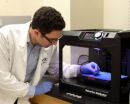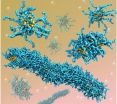(Press-News.org) According to researchers at the University of Montreal, the regions of the brain below the cortex play an important role as we train our bodies' movements and, critically, they interact more effectively after a night of sleep. While researchers knew that sleep helped us the learn sequences of movements (motor learning), it was not known why. "The subcortical regions are important in information consolidation, especially information linked to a motor memory trace. When consolidation level is measured after a period of sleep, the brain network of these areas functions with greater synchrony, that is, we observe that communication between the various regions of this network is better optimized. The opposite is true when there has been no period of sleep," said Karen Debas, neuropsychologist at the University of Montreal and leader author of the study. A network refers to multiple brain areas that are activated simultaneously.
To achieve these results, the researchers, led by Dr. Julien Doyon, Scientific Director of the Functional Neuroimaging Unit of the Institut universitaire de gériatrie de Montréal Research Centre, taught a group of subjects a new sequence of piano-type finger movements on a box. The brains of the subjects were observed using functional magnetic resonance imaging during their performance of the task before and after a period of sleep. Meanwhile, the same test was performed by a control group at the beginning and end of the day, without a period of sleep.
The researchers had already shown that the putamen, a central part of the brain, was more active in subjects who had slept. Furthermore, they had observed improved performance of the task after a night of sleep and not the simple passage of daytime. Using a brain connectivity analysis technique, which identifies brain networks and measures their integration levels, they found that one network emerged from the others—the cortico-striatal network—composed of cortical and subcortical areas, including the putaman and associated cortical regions. "After a night of sleep, we found that this network was more integrated than the others, that is, interaction among these regions was greater when consolidation had occurred. A night of sleep seems to provide active protection of this network, which the passage of daytime does not provide. Moreover, only a night of sleep results in better performance of the task," Debas said.
These results provide insight into the role of sleep in learning motor skills requiring new movement sequences and reveal, for the first time, greater interaction within the cortico-striatal system after a consolidation phase following sleep. "Our findings open the door to other research opportunities, which could lead us to better understand the mechanisms that take place during sleep and ensure better interaction between key regions of the brain. Indeed, several other studies in my laboratory are examining the role of sleep spindles—brief physiological events during non-rapid eye movement sleep—in the process of motor memory trace consolidation," Doyon said. "Ultimately, we believe that we will better be able to explain and act on memory difficulties presented by certain clinical populations who have sleeping problems and help patients who are relearning motor sequences in rehabilitation centres," Debas said.
INFORMATION:
About the study:
The article Off-line consolidation of motor sequence learning results in greater integration within a cortico-striatal functional network was published in the journal NeuroImage on May 17, 2014 (online publication). The study was led by Karen Debas, under the supervision of Julien Doyon. Both are affiliated with the Department of Psychology at the University of Montreal. Julie Carrier, Marc Barakat, Guillaume Marrelec, Pierre Belec, and Abdallah Hadj Tahar, researchers at the University of Montreal; Avi Karni, researcher at the University of Haifa; Leslie G. Ungerleider, researcher at the National Institute of Mental Health (USA); and Habib Benali, researcher at the Université Paris VI, also contributed to these studies. Their research was funded by the Canadian Institutes of Health Research and the Fonds de recherche du Québec en santé.
Learning to play the piano? Sleep on it!
Subcortical brain regions play a key role in the memorization process during sleep
2014-08-21
ELSE PRESS RELEASES FROM THIS DATE:
Electric sparks may alter evolution of lunar soil
2014-08-21
DURHAM, N.H. –- The moon appears to be a tranquil place, but modeling done by University of New Hampshire and NASA scientists suggests that, over the eons, periodic storms of solar energetic particles may have significantly altered the properties of the soil in the moon's coldest craters through the process of sparking—a finding that could change our understanding of the evolution of planetary surfaces in the solar system.
The study, published recently in the Journal of Geophysical Research-Planets, proposes that high-energy particles from uncommon, large solar storms ...
New feeding tube connectors will improve patient safety
2014-08-21
New feeding tube connectors, designed by an international standards process, will be available soon and will improve patient safety.
According to an invited review published in the OnlineFirst version of Nutrition in Clinical Practice (NCP), the official journal of the American Society for Parenteral and Enteral Nutrition (A.S.P.E.N.), the new connectors will greatly reduce the occurrence of misconnection that can be harmful and even fatal to patients.
Small-bore connectors, which are used to join medical devices, components, and accessories to deliver fluids or gases, ...
Emergency department nurses aren't like the rest of us: New study
2014-08-21
Emergency department nurses aren't like the rest of us – they are more extroverted, agreeable and open – attributes that make them successful in the demanding, fast-paced and often stressful environment of an emergency department, according to a new study by University of Sydney.
"Emergency nurses are a special breed," says Belinda Kennedy from Sydney Nursing School, a 15 year critical care veteran who led the study.
"Despite numerous studies about personalities of nurses in general, there has been little research done on the personalities of nurses in clinical specialty ...
Louisiana Tech University researchers use 3D printers to create custom medical implants
2014-08-21
RUSTON, La. – A team of researchers at Louisiana Tech University has developed an innovative method for using affordable, consumer-grade 3D printers and materials to fabricate custom medical implants that can contain antibacterial and chemotherapeutic compounds for targeted drug delivery.
The team comprised of doctoral students and research faculty from Louisiana Tech's biomedical engineering and nanosystems engineering programs collaborated to create filament extruders that can make medical-quality 3D printing filaments. Creating these filaments, which have specialized ...
Water and sunlight the formula for sustainable fuel
2014-08-21
An Australian National University (ANU) team has successfully replicated one of the crucial steps in photosynthesis, opening the way for biological systems powered by sunlight which could manufacture hydrogen as a fuel.
"Water is abundant and so is sunlight. It is an exciting prospect to use them to create hydrogen, and do it cheaply and safely," said Dr Kastoori Hingorani, from the ARC Centre of Excellence for Translational Photosynthesis in the ANU Research School of Biology.
Hydrogen offers potential as a zero-carbon replacement for petroleum products, and is already ...
Researchers develop models to study polyelectrolytes, including DNA and RNA
2014-08-21
Researchers from North Carolina State University have developed a novel and versatile modeling strategy to simulate polyelectrolyte systems. The model has applications for creating new materials as well as for studying polyelectrolytes, including DNA and RNA.
"Our new technique allows us to model much larger and more complex polyelectrolyte systems, and to do so much more quickly," says Nan Li, lead author of a paper on the work and a Ph.D. student in NC State's Department of Materials Science and Engineering. "This is a big step forward for this field."
Polyelectrolytes ...
Adherence to diet can be measured from blood
2014-08-21
New results from the Nordic SYSDIET study show that it's possible to assess dietary compliance from a blood sample. This is especially useful in controlled dietary intervention studies investigating the health benefits of specific diets. So far, such studies have mainly relied on the participants' self-reported dietary intake, which is often biased, making it more difficult to assess the real health benefits.
In the recently published study authored by Dr Matti Marklund and coworkers, the researchers were able to identify the study participants with the greatest apparent ...
A novel pathway for prevention of heart attack and stroke
2014-08-21
Finnish researchers have found that the low-expression variant of fatty acid-binding protein 4 (FABP4), which is particularly common among Finns, reduces the risk of heart attack and stroke. The finding revealed a promising new way to customise a potentially preventive drug for atherosclerosis.
Led by Professor Perttu Lindsberg, the long-term research project of the Department of Neurology at the Hospital District of Helsinki and Uusimaa (HUS) focuses on carotid atherosclerosis. It is a joint effort involving the University of Helsinki, the Helsinki University Central ...
Feeling bad at work can be a good thing (and vice versa)
2014-08-21
LIVERPOOL, UK – 05 August 2014: Research by the University of Liverpool suggests that, contrary to popular opinion, it can be good to feel bad at work, whilst feeling good in the workplace can also lead to negative outcomes.
In a Special Issue published in Human Relations, Dr Dirk Lindebaum from the University's Management School, together with his co-author Professor Peter Jordan, developed a new line of study, and commissioned research to further explore the role of emotions in the workplace.
They found that the commonly-held assumption that positivity in the workplace ...
Counselling has limited benefit on young people drinking alcohol
2014-08-21
Counselling techniques used to help young people with drinking problems may be of limited benefit, a new study suggests. In a systematic review published in The Cochrane Library, researchers found that an approach known as motivational interviewing did not substantially reduce drinking or alter alcohol-related behaviour.
Globally every year, around 320,000 young people between the ages of 15 and 29 die as a result of alcohol misuse. Most of these deaths are due to car accidents, murders, suicides or drowning. Motivational interviewing is a counselling technique developed ...
LAST 30 PRESS RELEASES:
Scientists discover why we know when to stop scratching an itch
A hidden reason inner ear cells die – and what it means for preventing hearing loss
Researchers discover how tuberculosis bacteria use a “stealth” mechanism to evade the immune system
New microscopy technique lets scientists see cells in unprecedented detail and color
Sometimes less is more: Scientists rethink how to pack medicine into tiny delivery capsules
Scientists build low-cost microscope to study living cells in zero gravity
The Biophysical Journal names Denis V. Titov the 2025 Paper of the Year-Early Career Investigator awardee
Scientists show how your body senses cold—and why menthol feels cool
Scientists deliver new molecule for getting DNA into cells
Study reveals insights about brain regions linked to OCD, informing potential treatments
Does ocean saltiness influence El Niño?
2026 Young Investigators: ONR celebrates new talent tackling warfighter challenges
Genetics help explain who gets the ‘telltale tingle’ from music, art and literature
Many Americans misunderstand medical aid in dying laws
Researchers publish landmark infectious disease study in ‘Science’
New NSF award supports innovative role-playing game approach to strengthening research security in academia
Kumar named to ACMA Emerging Leaders Program for 2026
AI language models could transform aquatic environmental risk assessment
New isotope tools reveal hidden pathways reshaping the global nitrogen cycle
Study reveals how antibiotic structure controls removal from water using biochar
Why chronic pain lasts longer in women: Immune cells offer clues
Toxic exposure creates epigenetic disease risk over 20 generations
More time spent on social media linked to steroid use intentions among boys and men
New study suggests a “kick it while it’s down” approach to cancer treatment could improve cure rates
Milken Institute, Ann Theodore Foundation launch new grant to support clinical trial for potential sarcoidosis treatment
New strategies boost effectiveness of CAR-NK therapy against cancer
Study: Adolescent cannabis use linked to doubling risk of psychotic and bipolar disorders
Invisible harms: drug-related deaths spike after hurricanes and tropical storms
Adolescent cannabis use and risk of psychotic, bipolar, depressive, and anxiety disorders
Anxiety, depression, and care barriers in adults with intellectual and developmental disabilities
[Press-News.org] Learning to play the piano? Sleep on it!Subcortical brain regions play a key role in the memorization process during sleep


